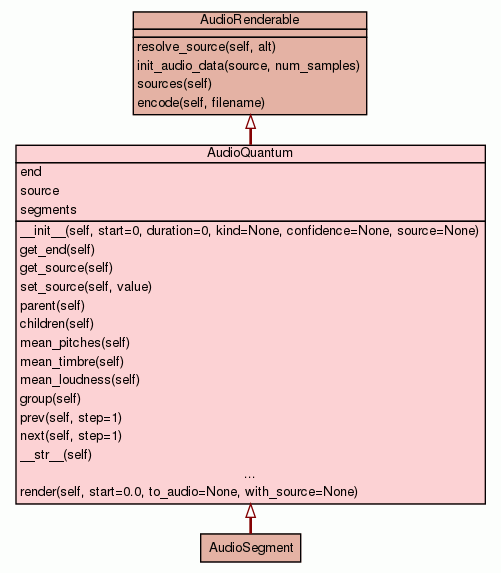A unit of musical time, identified at minimum with a start time and
a duration, both in seconds. It most often corresponds with a section,
bar, beat, tatum, or (by inheritance) segment obtained from an Analyze
API call.
|
|
|
|
|
|
|
|
get_source(self)
Returns itself or its parent. |
source code
|
|
|
|
|
|
|
parent(self)
Returns the containing AudioQuantum in the rhythm hierarchy:
a tatum returns a beat, a beat returns a bar, and a bar returns a
section.
Note that some AudioQuantums have no parent. None will be returned in this case. |
source code
|
|
|
|
children(self)
Returns an AudioQuantumList of the AudioQuanta that it contains,
one step down the hierarchy. A beat returns tatums, a bar returns
beats, and a section returns bars. |
source code
|
|
|
|
mean_pitches(self)
Returns a pitch vector that is the mean of the pitch vectors of any segments
that overlap this AudioQuantum.
Note that this means that some segments will appear in more than one AudioQuantum. |
source code
|
|
|
|
mean_timbre(self)
Returns a timbre vector that is the mean of the pitch vectors of any segments
that overlap this AudioQuantum.
Note that this means that some segments will appear in more than one AudioQuantum. |
source code
|
|
|
|
mean_loudness(self)
Returns the mean of the maximum loudness of any segments that overlap this AudioQuantum.
Note that this means that some segments will appear in more than one AudioQuantum. |
source code
|
|
|
|
|
|
|
|
|
|
|
|
|
|
|
|
__repr__(self)
A string representing a constructor, including kind, start time,
duration, and (if it exists) confidence, e.g.: |
source code
|
|
|
|
local_context(self)
Returns a tuple of (index, length) within rhythm siblings, where
index is the (zero-indexed) position within its group(), and
length is the number of siblings within its group(). |
source code
|
|
|
|
absolute_context(self)
Returns a tuple of (index, length) within the containing
AudioQuantumList, where index is the (zero-indexed) position within
its container, and length is the number of siblings within the
container. |
source code
|
|
|
|
context_string(self)
Returns a one-indexed, human-readable version of context.
For example: |
source code
|
|
|
|
__getstate__(self)
Eliminates the circular reference for pickling. |
source code
|
|
|
|
|
|
|
| render(self,
start=0.0,
to_audio=None,
with_source=None) |
source code
|
|
|
Inherited from AudioRenderable:
encode,
resolve_source,
sources
Inherited from object:
__delattr__,
__format__,
__getattribute__,
__hash__,
__new__,
__reduce__,
__reduce_ex__,
__setattr__,
__sizeof__,
__subclasshook__
|

